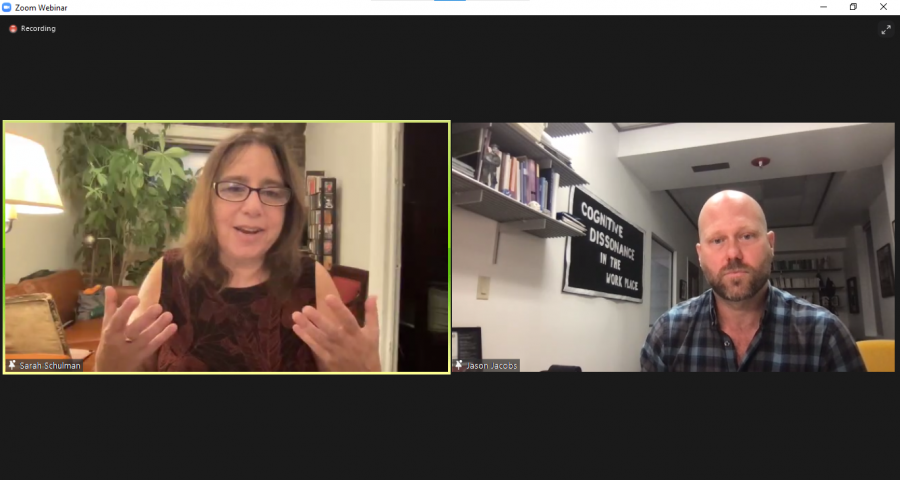Library Talk (Sept. 28)
Courtesy of RWU Library on Zoom
Sarah Schulman and Dean Jacobs during the September 28 Library Talk.
RWU welcomed AIDS activist and writer Sarah Schulman to the first Talking in the Library event of the semester on Sept. 28. Dean of Undergraduate Studies Jason Jacobs interviewed Schulman on her history with the AIDS movement as well as on her recent book, “Let the Record Show: A Political History of ACT UP New York, 1987-1993.”
The AIDS Coalition to Unleash Power (ACT UP) was an extremely influential group during the HIV/AIDS epidemic of the late twentieth century.
Among other victories, the organization achieved legal needle exchange in New York City, made the Center for Disease Control and Prevention (CDC) change the definition of AIDS so women could receive proper medication and care and changed how people with AIDS — and queer individuals — were seen by the world.
The group also forced the Food and Drug Administration (FDA) to release AIDS medication for public use before they were officially approved, thus getting patients critical treatment sooner; these protocols run parallel to today’s crucial COVID-19 vaccination measures.
HIV/AIDS is a sexually transmitted immunodeficiency disease that causes patients to contract severe opportunistic infections that end in death. AIDS is the final stage of untreated HIV.
At the time of ACT UP’s prominence, there was no real treatment or cure; all people could do was wait to get sick. Suspicion and fear overtook communities and discrimination against the queer community skyrocketed.
Keep in mind that, in 1981, gay sex was illegal; an openly gay person living in New York City could be kicked out of their apartment or fired for the crime of being who they were.
As Schulman reminded the audience, the Supreme Court didn’t overturn sodomy laws until 2003. Schulman pointed out that even today there is no federal bill advocating for gay rights and despite the recent legalization of gay marriage, the US has a very long road ahead to equal rights. Some states still don’t allow same-sex couples to adopt or foster children.
After taking part as an active member of ACT UP, Schulman saw the organization dissipate in the 1990s. Realizing the movement was in danger of being lost to history, Schulman, with the help of a colleague, interviewed 188 surviving ACT UP members and made the records public online in 2001. Twenty years later, she published these stories in a cohesive narrative for all who wish to learn about the organization and the AIDS epidemic.
“The people in ‘Let the Record Show’ are very special people, they are very individual, and they have their own point of view…the willingness to disagree and the willingness to work with people who disagree is what drove that movement forward,” said Schulman.
Discourse, she explained, was a big part of ACT UP; members did not agree on solutions, but through this dialogue, the organization found great success.
In addition, Schulman said it is crucial to “constantly be creative” in order to move society forward. One case in point occurred in 1987, at ACT UP’s beginning: the camcorder had just been invented, and with it came a new age of video activism.
“I don’t think it’s worth imitating something from another era,” Schulman told the audience.
She said it is important to put new movements in modern contexts.
Schulman had many words of wisdom for the discussion’s audience, but her last statement rang particularly true. A question was posed: How do we make people stop and listen in a world where everyone is inundated with information and pleas for action and opinions?
Schulman immediately said, “You can’t make people stop and listen, but you can stop and listen.”







